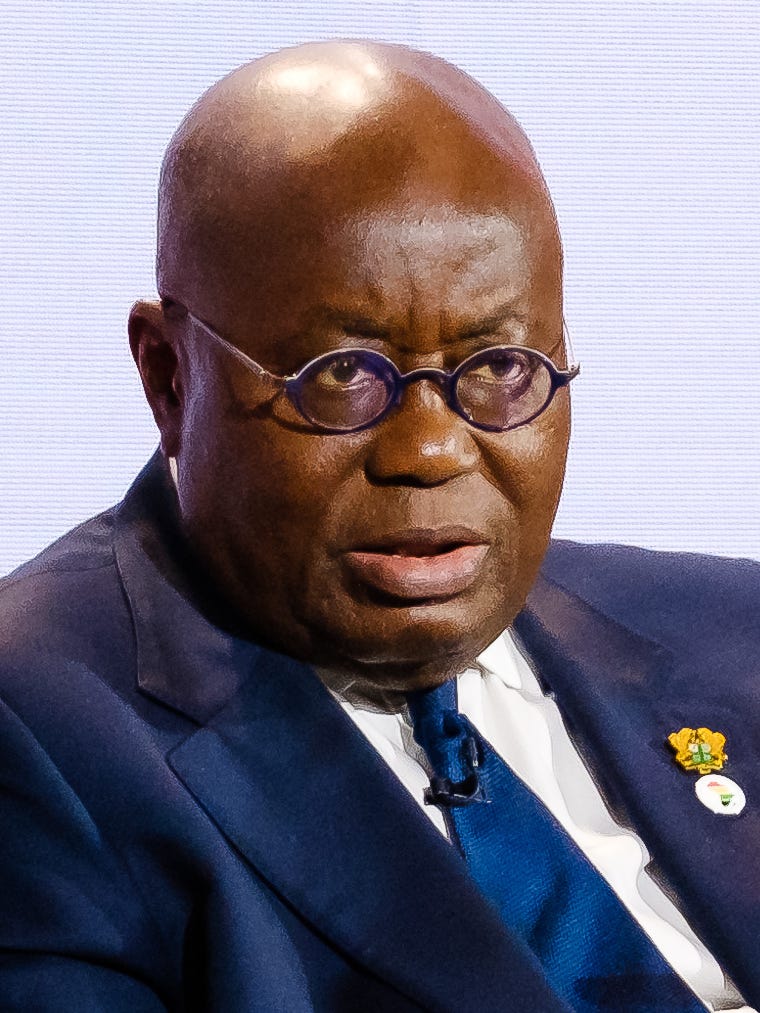🔅 The Crater of Controversy: Ghana's $400m National Cathedral
Plus: How Africa's Universities are Rising in Global Rankings, Kenya's Money Woes, And much more... ☕
Photo of the day: Kinshasa, DRC

Markets: Year-to-Date
🔻 Nigerian SE: 51,028.62 (-0.29%)
🔻 Johannesburg SE: 78,500.86 (-0.38%)
— Ghana SE: 2,664.60 (0.00%)
🔻 Nairobi SE: 107.84 (-0.75%)
🔻 US S&P 500: 4,130.98 (-0.57%)
🔻 Shanghai Composite: 3,367.03 (-0.09%)
*Data accurate as of the close of markets across the continent
ECONOMY
The Crater of Controversy: Ghana's $400m National Cathedral
![Stalled work at the construction site of the Ghana National Cathedral in Accra, Ghana, on November 30, 2022 [Nipah Dennis/ Al Jazeera] Stalled work at the construction site of the Ghana National Cathedral in Accra, Ghana, on November 30, 2022 [Nipah Dennis/ Al Jazeera]](https://substackcdn.com/image/fetch/$s_!347J!,w_1456,c_limit,f_auto,q_auto:good,fl_progressive:steep/https%3A%2F%2Fsubstack-post-media.s3.amazonaws.com%2Fpublic%2Fimages%2Fffe8848a-f238-4395-8859-0c1b8a35a159_770x513.jpeg)
Ghana’s national cathedral project has stalled since June due to a lack of funds… but that hasn’t stopped people from talking about it.
The cathedral, which President Nana Akufo-Addo vowed to help build to the “glory and honour” of God, has split believers into two major camps: those who want to see it built, and those who see it as a waste of state resources.
How much is it going to cost?
The cost was initially estimated at $100m, but it has now quadrupled due to inflation.
Most of the money so far has come from the national coffers, and Finance Minister Ken Ofori-Atta had promised it wouldn't “put undue financial burdens on the state”.
However, when the government requested $6.3m to continue the project, parliament blocked it, due to the country’s economic crisis and its debt of $45 billion.
What's the point of it all?
The government argues that the cathedral is a strategic project that will bring economic benefits, creating jobs and accruing more revenue for the state.
The 5,000-seat auditorium would host national events like state funerals and presidential inaugural services, and it would also be home to Africa’s first Bible Museum and Documentation Centre.
But critics accuse the government of milking state coffers in the name of religion.
“We should be building hospitals and schools,” actor and activist Yvonne Nelson says. “People are dying. I don’t think any Ghanaian is complaining about where to worship, but we complain about the health sector.
We complain about schools. For churches, we have many. God looks at the heart, and so let’s get our priorities right.”
Share Baobab with friends and colleagues for free daily updates on African business, money, and current affairs.
OTHER HEADLINES
Across the Continent

🎓 How Africa's Universities are Rising in Global Rankings | A decade ago, the head of the University of Cape Town, Max Price, wrote an article in Times Higher Education making a case for African universities to compete against the best in the world. Fast forward to today and Price can feel vindicated. In 2012, there were only four African universities in the global rankings. Now, there are 97! Five countries entered the rankings for the first time ever this year, all of them African. And Nigeria is the fastest-rising nation in the world for the impact of its research. Governments are providing more funding and resources to universities, and there’s a culture of data collection and benchmarking that’s driving universities to become more competitive.
🇰🇪 Kenya's Money Woes: Will Govt Employees Get Paid? | It’s a time of financial hardship in Kenya—civil servants, legislators, and ministers haven’t been paid since March, and the government needs $434 million just to cover salaries and pensions every month. Treasury Secretary Njuguna Ndung’u has warned of “tough times ahead,” and threatened employees have already gone on strike. But it looks like the country’s been heading this way for a while. Deputy President Rigathi Gachagua pointed to the previous administration’s “big appetite for loans” as the root cause of the crisis, while opposition leader Raila Odinga denied any involvement. David Ndii, chair of the president’s council of economic advisers, said the crisis was a “liquidity crunch” and that the government had secured loans to get out of it. However, he also noted that corruption and wasteful spending have been draining the country’s funds for years.
🇸🇸 Diplomats and Citizens Fleeing Sudan Amidst Violence | As violence between rival generals has continued for nine days, diplomats, staff, and citizens have been desperately seeking safety. Nations like the US and UK airlifted their diplomats out of the capital of Khartoum, while other Sudanese citizens took dangerous roads or crossed the northern frontier into Egypt. Saudi Arabia also sent a navy ship to evacuate 157 people, including 91 Saudis. With thick, black smoke filling the sky over Khartoum’s airport and a “near-total collapse” of internet and phone connections, it’s a tense time in the capital.
FOOD FOR THOUGHT
Proverb of the Day
“In the moment of crisis, the wise build bridges and foolish build dams.”
— Nigerian Proverb.






